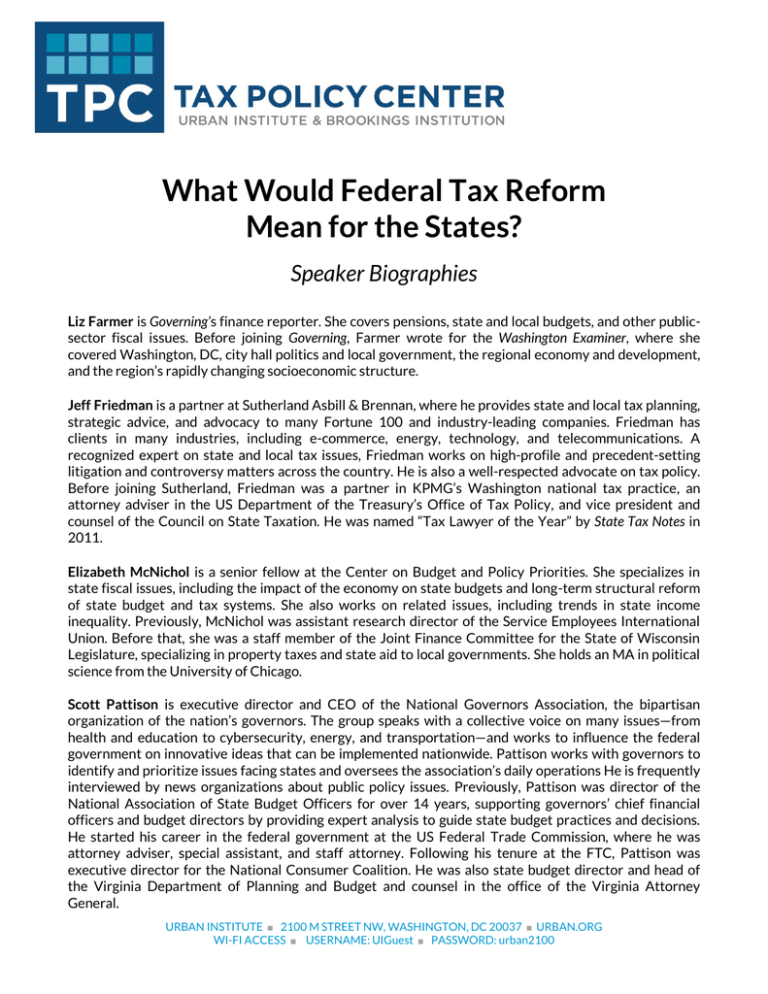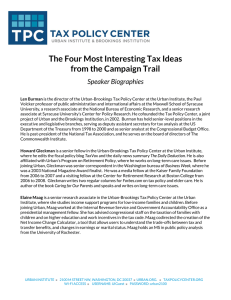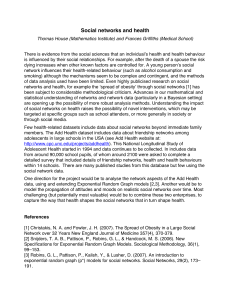What Would Federal Tax Reform Mean for the States? Speaker Biographies
advertisement

What Would Federal Tax Reform Mean for the States? Speaker Biographies Liz Farmer is Governing’s finance reporter. She covers pensions, state and local budgets, and other publicsector fiscal issues. Before joining Governing, Farmer wrote for the Washington Examiner, where she covered Washington, DC, city hall politics and local government, the regional economy and development, and the region’s rapidly changing socioeconomic structure. Jeff Friedman is a partner at Sutherland Asbill & Brennan, where he provides state and local tax planning, strategic advice, and advocacy to many Fortune 100 and industry-leading companies. Friedman has clients in many industries, including e-commerce, energy, technology, and telecommunications. A recognized expert on state and local tax issues, Friedman works on high-profile and precedent-setting litigation and controversy matters across the country. He is also a well-respected advocate on tax policy. Before joining Sutherland, Friedman was a partner in KPMG’s Washington national tax practice, an attorney adviser in the US Department of the Treasury’s Office of Tax Policy, and vice president and counsel of the Council on State Taxation. He was named “Tax Lawyer of the Year” by State Tax Notes in 2011. Elizabeth McNichol is a senior fellow at the Center on Budget and Policy Priorities. She specializes in state fiscal issues, including the impact of the economy on state budgets and long-term structural reform of state budget and tax systems. She also works on related issues, including trends in state income inequality. Previously, McNichol was assistant research director of the Service Employees International Union. Before that, she was a staff member of the Joint Finance Committee for the State of Wisconsin Legislature, specializing in property taxes and state aid to local governments. She holds an MA in political science from the University of Chicago. Scott Pattison is executive director and CEO of the National Governors Association, the bipartisan organization of the nation’s governors. The group speaks with a collective voice on many issues—from health and education to cybersecurity, energy, and transportation—and works to influence the federal government on innovative ideas that can be implemented nationwide. Pattison works with governors to identify and prioritize issues facing states and oversees the association’s daily operations He is frequently interviewed by news organizations about public policy issues. Previously, Pattison was director of the National Association of State Budget Officers for over 14 years, supporting governors’ chief financial officers and budget directors by providing expert analysis to guide state budget practices and decisions. He started his career in the federal government at the US Federal Trade Commission, where he was attorney adviser, special assistant, and staff attorney. Following his tenure at the FTC, Pattison was executive director for the National Consumer Coalition. He was also state budget director and head of the Virginia Department of Planning and Budget and counsel in the office of the Virginia Attorney General. URBAN INSTITUTE 2100 M STREET NW, WASHINGTON, DC 20037 URBAN.ORG WI-FI ACCESS USERNAME: UIGuest PASSWORD: urban2100 Frank Sammartino is a senior fellow at the Urban-Brookings Tax Policy Center and an affiliate of Urban’s State and Local Finance Initiative. His work focuses on the interaction among federal, state, and local tax policies and on the influence of tax and transfer policies on income inequality. Sammartino has written extensively about federal tax and retirement policy issues. In an earlier stint at Urban, he designed and developed the initial version of the Tax Policy Center microsimulation model, which researchers use to analyze how federal tax policies affect federal revenues and families at different income levels. He also led a team of researchers in developing a new version of the Dynamic Simulation of Income Model, which Urban researchers use to analyze how public policies and economic and demographic forces shape retirement income security. Before returning to Urban, Sammartino spent 20 years at the Congressional Budget Office, serving most recently as the assistant director for tax analysis. He was also chief economist and deputy director at the Joint Economic Committee of the US Congress. Sammartino holds undergraduate and graduate degrees in economics from Boston College and the University of Wisconsin– Madison, respectively. Sarah Rosen Wartell became the third president of the Urban Institute in February 2012. A public policy executive and housing markets expert, Wartell was deputy assistant to the president for economic policy and deputy director of the National Economic Council. At the US Department of Housing and Urban Development from 1993 to 1998, she advised the federal housing commissioner on housing finance, mortgage markets, and consumer protection. In 2012, she was named a “Woman of Influence” by HousingWire. Wartell cofounded the Center for American Progress, serving as its first chief operating officer and general counsel. Later, as executive vice president, she oversaw its policy teams and fellows. Her work focused on the economy and housing markets, and she directed the Mortgage Finance Working Group and "Doing What Works" government performance program. She previously practiced law with the Washington, DC, firm Arnold & Porter and was a consultant to the bipartisan Millennial Housing Commission. Wartell currently serves on the boards of the Low Income Investment Fund, Center for Law and Social Policy, and Center for Urban Science and Progress at New York University. She is also a Penn Institute for Urban Research Scholar. Her areas of expertise include community development, consumer finance, asset building, and housing finance. Wartell has an AB degree with honors in urban affairs from Princeton University's Woodrow Wilson School of Public and International Affairs. She has a JD degree from Yale Law School. URBAN INSTITUTE 2100 M STREET NW, WASHINGTON, DC 20037 URBAN.ORG WI-FI ACCESS USERNAME: UIGuest PASSWORD: urban2100





